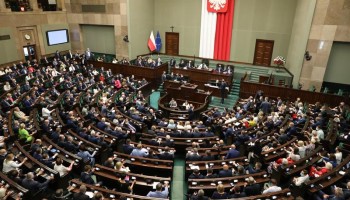Progress between member countries has been “uneven,” Vice-President of the Commission Věra Jourová pointed out. She added that “there are causes for serious concern in a number of Member States, especially when it comes to the independence of judiciary.”
This is the case in Poland, where anti-corruption laws are largely in place but “structural weaknesses” and a risk of undue political pressure on corruption prosecutions continue to undermine the procedure.
Hungary, under Viktor Orbán’s term as prime minister, is fending off criticism for political party financing, lobbying, and risks of nepotism.
“Concerns remain regarding the lack of systematic checks and insufficient oversight of asset and interest declarations,” the report stated. “While the indictment rate for corruption cases is high, and some new high-level corruption cases were opened since 2020, the track record for investigations of allegations concerning high-level officials and their immediate circle remains limited,” the report said.
The document adds pressure on Poland and Hungary, whose share of the EU COVID recovery fund have yet to be approved. Hungary has been budgeted some US$8.4 billion, while Poland is set to receive $24 billion in EU grants.
By contrast, some countries, like Sweden and Finland -— perceived to be among the least corrupt in the world — earned plaudits from the EU Commission for their counter-corruption efforts.
While the report showed that many countries have strengthened reforms for the rule of law in the past year, it also recommended countries better prepare for future crises like the pandemic.
Like in its first year, the second EU-wide report was produced after several months’ worth of meetings and virtual country visits. It is intended to stir change in the EU, though its usefulness — moderated by extensive collaboration with country representatives and bureaucratic language — has been called into question by some democracy advocates.
“It doesn’t come with legal sanctions, deadlines, recommendations, nothing concrete,” Laurent Pech, a European law specialist at Middlesex University told Politico.
Other analyses in the document were more mixed. The report acknowledged the “wide range of anti-corruption reforms that Greece has embarked on in the past years,” though logistical delays and insufficient resources have still hampered progress in some corruption cases.
Germany, France, Italy and Spain were recognized for positive developments in anti-corruption, though shortcomings remain.
Slovakia, which has been ramping up its efforts to repress corruption, was noted for planning draft legislation on lobbying and political conflicts of interests.
EU Justice Commissioner Didier Reynders said that the 2020 report encouraged positive reforms related to the rule of law and sparked dialogue in specific countries.
“This year, we have further deepened our assessment,” Reynders said. “The report can help us to have a real dialogue as a Union, side by side, in an honest and open spirit.”






